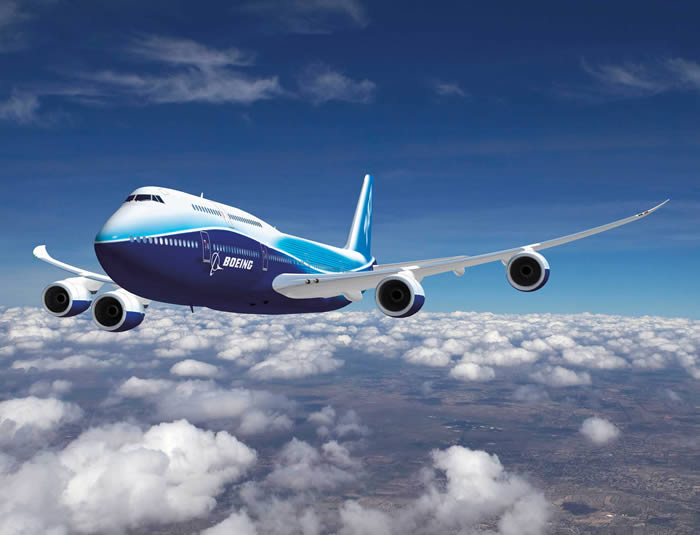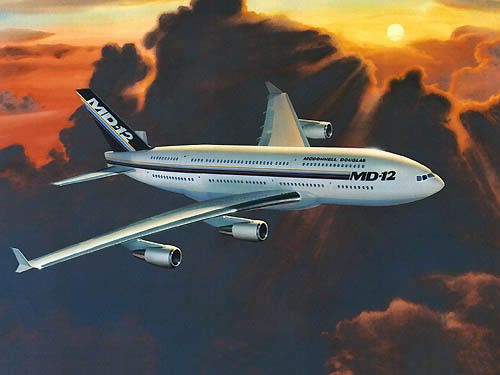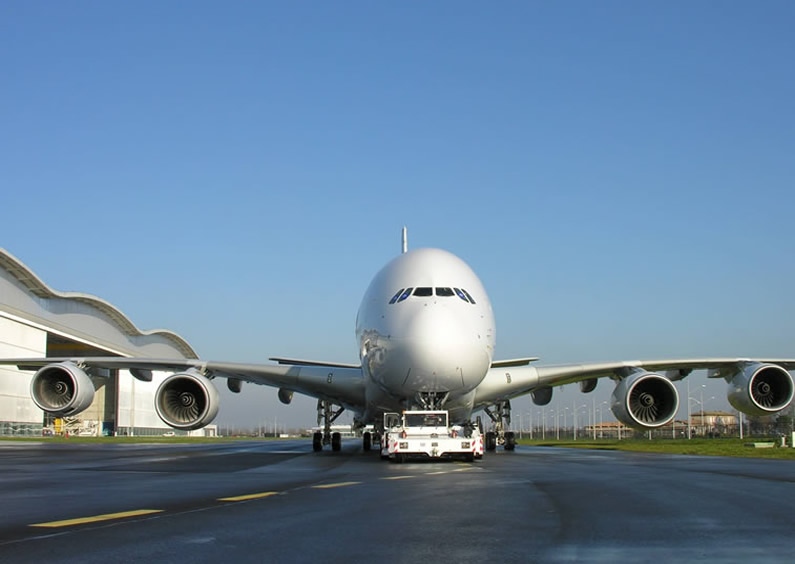2050 x-plane Airbus concept aircraft MD12 A380

The Airbus Concept Plane represents an engineer's dream about what an aircraft could look like in the long term future.
It's not a real aircraft and all the technologies it features, though feasible, are not likely to come together in the same manner. Here we are stretching our imagination and thinking beyond our usual boundaries.
With the Airbus Concept Plane we want to stimulate young people from all over the world to engage with us so that we can continue to share the benefits of air transport while also looking after the environment.

Further future-gazing by Airbus shows blueprints for radical aircraft interiors. In 'The Future by Airbus' the company talks of morphing seats made from ecological, self-cleaning materials, which change shape for a snug fit; walls that become see-through at the touch of a button, affording 360 degree views of the world below; and holographic projections of virtual decors, allowing travelers to transform their private cabin into an office, bedroom or Zen garden!
'Green' energy sources like fuel cells, solar panels or even our own body heat might provide energy for powering some systems on tomorrow's aircraft. As aeronautics engineers continue to use nature as a source of inspiration, some of these aircraft may even fly in formation like birds to reduce drag, fuel burn and therefore emissions.

Airbus A380 Superjumbo
Emirates Airline, owned by the government of Dubai, will make the first commercial flight of Airbus A380 Superjumbo aircraft to Pearson International Airport in Toronto, Canada, on June 1, 2009.
The Airbus A380 is a double-deck, wide-body, four-engine airliner manufactured by the European corporation Airbus, a subsidiary of EADS. The largest passenger airliner in the world, the A380 made its maiden flight on 27 April 2005 from Toulouse, France, and made its first commercial flight on 25 October 2007 from Singapore to Sydney with Singapore Airlines. The aircraft was known as the Airbus A3XX during much of its development phase, but the nickname Superjumbo has since become associated with it.
The A380's upper deck extends along the entire length of the fuselage, and its width is equivalent to that of a widebody aircraft. This allows for an A380-800's cabin with 5,146 square feet (478.1 m2) of floor space; 49% more floor space than the next-largest airliner, the Boeing 747-400 with 3,453 square feet (320.8 m2), and provides seating for 525 people in a typical three-class configuration or up to 853 people in all-economy class configurations. The postponed freighter version, the A380-800F, is offered as one of the largest freight aircraft, with a payload capacity exceeded only by the Antonov An-225.[3] The A380-800 has a design range of 15,200 km (8,200 nmi), sufficient to fly from New York to Hong Kong for example, and a cruising speed of Mach 0.85 (about 900 km/h or 560 mph at cruising altitude).
National origin Multi-national
Manufacturer Airbus
First flight 27 April 2005
Introduced 25 October 2007 with Singapore Airlines
Status In production
Primary users Singapore Airlines Emirates Qantas Air France
Produced 2004–present
Number built 47 (as of 16 July 2010)[1]
Unit cost US$ 317.2–337.5 million





McDonnell-Douglas MD-12
General characteristics
* Capacity: 606 passengers
* Length: 240 ft (73 m)
* Wingspan: 255 ft 0 in (77.7 m)
* Height: 100 ft ( 30.48 m ) ()
* Max takeoff weight: 1,214,800 lb (552,182 kg)
* Powerplant: 4× high-bypass turbofan engines, 70,000 lbf (310 kN) each
Performance
* Range: 9,086 miles (14,538 km)
The Boeing NLA, or New Large Airplane, was a 1990s concept for an all-new airliner in the 500+ seat market. Somewhat larger than the 747, this aircraft was similar in concept to the McDonnell Douglas MD-12 and later Airbus A380. In 1993, Boeing chose not to pursue development of this concept, focusing instead on updates to the 747.

A380 heavy
The Airbus A380 superjumbo is so quiet it's stopping pilots from sleeping during rest breaks on long-haul flights, according to reports.
Flight International says Emirates pilots have complained that the lack of engine noise is preventing them from sleeping in the crew rest area.
The constant buzz of engine noise usually drowns out the sounds of passengers, but pilots says they are being kept awake by crying babies, flushing toilets and call bells.

The Airbus A380 glass cockpit featuring "pull out keyboards and 2 wide computer screen on the sides for pilots...
Onboard Airport Navigation System (OANS) Airport Mapping Database (AMDB) The Head-Up Display (HUD) is making its first appearance on an A380 aircraft with the entry into service of the A380 with Air France, the first airline to select the Thales HUD (in dual configuration) for this aircraft type. The European Aviation Safety Agency certified the Thales HUD on the A380 in both single (left seat only) and dual (left and right seats) configurations. Other Thales A380 HUD customers include China Southern Airlines and Korean Air.
 Earth's magnetic field:
Earth's magnetic field:

0 Comments:
Post a Comment
<< Home